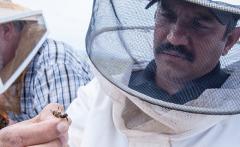OSU bee researcher Ramesh Sagili inspects a European honey bee in a carrot seed field near Madras, Ore. Photo by Lynn Ketchum
CORVALLIS, Ore. –Well-nourished honey bees are better at fighting off a serious microscopic parasite that weakens their immune systems and threatens the health of their colonies, according to a new study from Oregon State University.
The finding, published recently in the Journal of Insect Physiology, suggests that giving honey bees access to a greater quantity and variety of pollen—their only source of protein—could make them more resilient against parasites and other pests, and help to stem worrisome declines in bee populations.
“We found that bees fed with a high-pollen diet had better survival, even though the same diet also enhanced the reproduction of the pathogen,” said Ramesh Sagili, a professor and honey bee Extension specialist in OSU’s College of Agricultural Sciences.
Pests, diseases and pesticide exposure are all contributing to a worldwide decline in populations of honey bees and other important pollinators, Sagili said. According to the USDA Agricultural Research Service, U.S. beekeepers lost about 33 percent of their colonies each winter between 2006 and 2011.
Pollination by honey bees and other insects was worth slightly over $15 billion in the U.S. in 2012, according to a 2014 economic analysis. Sagili estimates that honey bees pollinate some $500 million worth of Oregon crops yearly.
Sagili and Cameron Jack, a doctoral student in horticulture, studied European honey bees, the species most commonly used commercially in the U.S. to pollinate agricultural crops. They fed bees with varying amounts of wildflower pollen, then exposed them to a single-celled microsporidian, a fungus-like organism called Nosema ceranae that lives in bees’ digestive systems.
At high levels the pest disrupts protein metabolism, weakens immune systems, and causes malnourishment in the next generation of bees. A severe infestation can deplete the population of bees within a colony and may eventually cause it to collapse.
One group of experimental bees ate an all-pollen diet, as did the control group that wasn’t exposed to the parasite. Three other groups ate pollen mixed with non-nutritive cellulose in successively leaner ratios, with one part pollen to one, two and three parts cellulose, respectively. The fifth group got cellulose only.
After 16 days, Sagili and his group counted the N. ceranae spores in bees from each group. The researchers were surprised to find that the bees fed the high-pollen diets had significantly more N. ceranae spores in their gut tissues.
However, these bees were also in better shape overall than the ones fed on lower pollen diets. They survived longer, and they had more protein in their hypopharyngeal glands—the structures in their heads that transform pollen into food for the larvae.
“It may seem counterintuitive that the protein from the pollen enhanced the reproduction of the pathogen,” said Sagili. “But the important point is that the bees were able to compensate for its negative effects.”
The impetus for this study, he said, came from his Extension constituents. Many Oregon beekeepers worry that preventive antibiotic treatments — the conventional way to combat N. ceranae and a related parasite, N. apis — might be doing more harm than good.
“Treatment is expensive, and especially so if you don’t know whether your bees have the pathogen,” said Sagili. “It’s also troublesome because the treatment is a broad-spectrum antibiotic that could be causing other problems, such as killing the beneficial gut flora that help bees digest their food.”
Bee experts have worried for some time that “working” honey bees with access only to monocultural plantings are not getting enough nourishment to thrive. Some are giving their bees a few weeks’ break from work and letting them forage in uncultivated areas.
“It’s a limited menu for them,” Sagili said. “It’s as if you or I were to eat nothing but chicken for two months. We think a polyfloral diet can definitely enhance bee nutrition by providing a variety of amino acids and other nutritional elements.”
In addition, many beekeepers already feed their bees extra rations in early spring when they’re rearing new brood, and in the fall when they’re preparing to overwinter. These supplemental feedings may also enhance resistance to N. ceranae, Sagili said.
He cautioned that too much protein can also be harmful to bees.
“It appears that there is an optimal balance of nutrients needed for best survival,” he said. “We now need to do some trials in the field to determine how much protein is optimal.”







